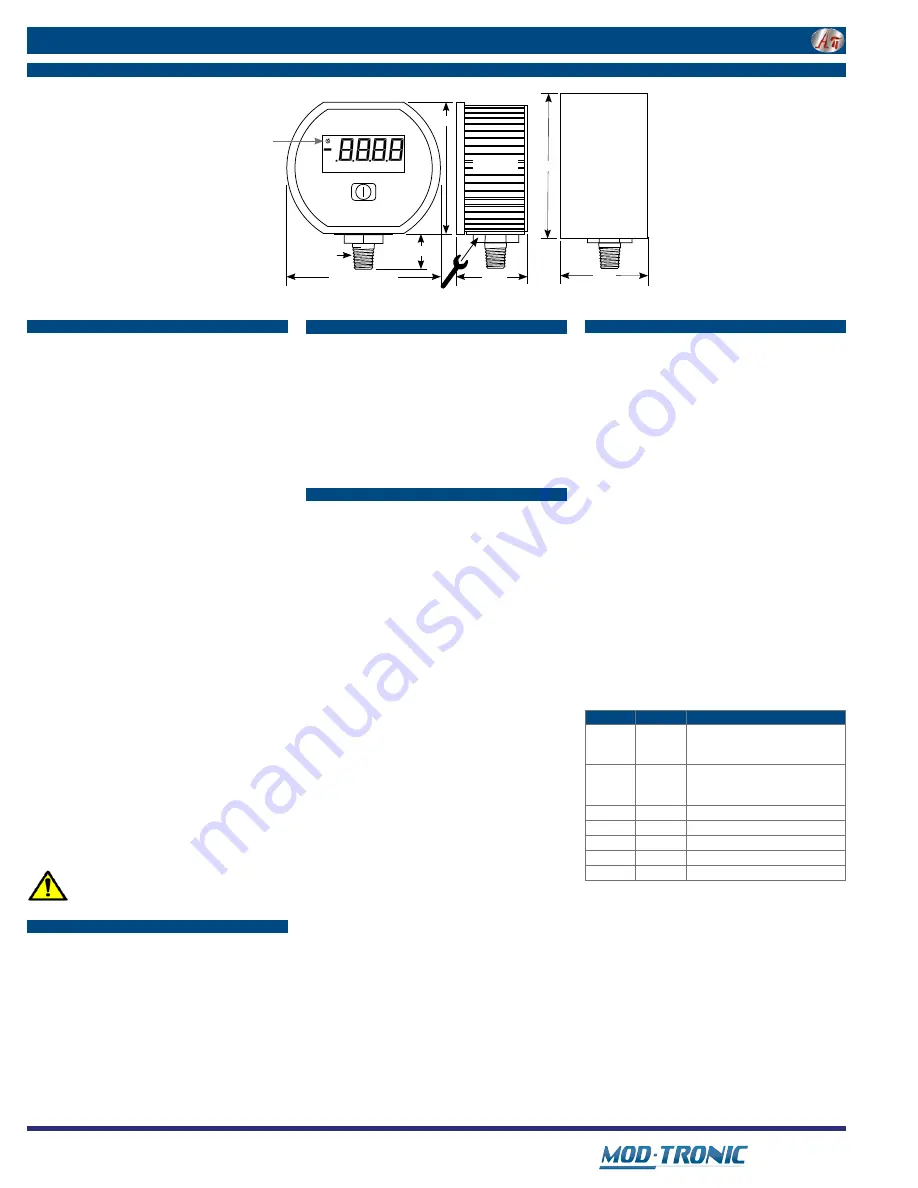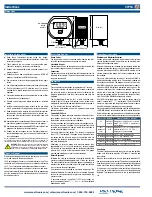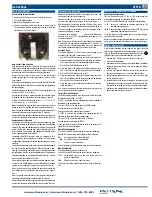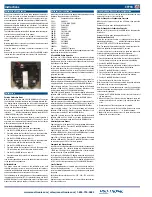
4
Read these instructions before using the gauge.
Configuration may be easier before installation. Contact the
factory for assistance.
4
These products do not contain user-serviceable parts.
Contact us for repairs, service, or refurbishment.
4
Gauges must be operated within specified ambient tem-
perature ranges.
4
Outdoor or wash down applications require a NEMA 4X
gauge or installation in a NEMA 4X housing.
4
Use a pressure or vacuum range appropriate for the appli-
cation.
4
Use fittings appropriate for the pressure range of the gauge.
4
Due to the hardness of 316 stainless steel, it is recom-
mended that a thread sealant be used to ensure leak-free
operation.
4
For contaminated media use an appropriate screen or filter
to keep debris out of gauge port.
4
Remove system pressures before removing or installing
gauge.
4
Install or remove gauge using a wrench on the hex fitting
only. Do not attempt to turn gauge by forcing the housing.
4
Good design practice dictates that positive displacement
liquid pumps include protection devices to prevent sen-
sor damage from pressure spikes, acceleration head, and
vacuum extremes.
p
Avoid permanent sensor damage! Do not apply vacuum to
non-vacuum gauges or hydraulic vacuum to any gauges.
p
Avoid permanent sensor damage! NEVER insert objects into
gauge port or blow out with compressed air.
Gauges are not for oxygen service. Accidental rupture of
sensor diaphragm may cause silicone oil inside sensor to
react with oxygen.
Bipolar ranges read positive pressure and vacuum in the same
units, and zero with the gauge port open.
1000 psi and higher sensor are a sealed reference type. They
read zero with the gauge port open are internally referenced
to 14.7 psi. Functionally similar to gauge reference sensors.
Absolute reference gauges read zero at full vacuum and atmo-
spheric pressure with the gauge port open. With an open gauge
port the readings will vary continuously due to the effects of
barometric pressure.
Range Codes
The range code is part of the gauge model number and indi-
cates the default range when the gauge is ordered.
Selectable Ranges
Engineering units may be changed to any of those listed in the
same sensor range as shown in the range table.
Conversion
Engineering units are calculated from the factory default unit to
the newly selected units. The ranges listed under the psi sensor
range are rounded off.
Power-Up
Press and hold the front button for approximately 1 second.
The display is tested, the default full-scale range is indicated,
the full-scale range in the selected units are indicated, the
display is tested again, then the actual pressure and units are
displayed.
The backlighting will turn on for 1 minute and then auto-
matically shut off. Display backlighting can be turned on by
momentarily pressing the power button whenever the gauge is
on. This also restarts the auto shutoff timer.
The display backlighting will not be apparent under bright
lighting conditions.
Power-Up With Zero
This applies to gauge reference models only. Absolute refer-
ence gauges do not use the zero feature since they read
atmospheric pressure under normal conditions.
Be sure the gauge port is exposed to normal atmospheric pres-
sure and no pressure is applied. The zeroing function is only
activated at each power-up and the stored zero correction is
erased when the gauge is shut off.
Press and hold the front button. The display is tested and
then
oooo
is displayed. The gauge is now zeroed. Release
the button and the full-scale range in the selected units are
indicated, the display is tested again, then the actual pressure
and units are displayed.
Attempting to zero the gauge with pressure greater than
approximately 3% of full-scale pressure or vacuum applied
will result in an error condition, and the display will alternately
indicate Err 0 and the actual measured pressure. The gauge
must be powered down to reset the error condition.
Normal Operation
Following the start-up initialization, the display indicates the
pressure reading updated approximately 3 times per second.
The auto shutoff timer starts when the gauge is powered up or
whenever the button is pushed, unless the gauge shutoff time
was set to zero for on/off operation.
If excessive vacuum is applied to a pressure-only gauge, the
display will indicate -Err until the vacuum is released. Applying
vacuum to a gauge designed for pressure may damage the
pressure sensor.
If excessive pressure is applied (112.5% over range), an
out-of-range indication of 1 – – – or 1.–.–.– will be displayed
depending on model.
Minimum and Maximum Readings
Gauges are normally configured with minimum and maximum
capture functions enabled. One or both can be disabled in the
Advanced Configuration mode.
Minimum and maximum readings are continuously stored and
updated whenever the gauge is on. The stored readings can be
manually cleared if desired. The MAX and MIN memory is also
cleared whenever the gauge is off unless configured to save
the readings.
Press and hold the button for about 1 second until MAX is
displayed alternating with the units. The maximum reading will
be continuously updated. The gauge may be left in this mode.
After MAX is displayed, press and hold the button for about 1
second until MIN is displayed alternating with the units. The
minimum reading will be continuously updated. The gauge
may be left in this mode. If excessive vacuum is applied to a
pressure-only gauge while in this mode, the display will indi-
cate -Err until the MAX/MIN readings are cleared.
After MIN is displayed, press and hold the button again for
about 1 second until * * * * is displayed. The MAX and MIN
memory is not erased and the gauge returns to normal opera-
tion with the display indicating the current reading.
Press and continue to hold the button until the display indicates
clr MX/MN (about 3 seconds total) and then release the button.
Both maximum and minimum values are cleared and the gauge
returns to the normal mode and displays the current pressure.
Shut-Down
To shut off the gauge manually at any time, press and hold the
button until the display indicates OFF (about 5 seconds) and
then release.
When an auto shutoff timer is used, the display indicates OFF
five seconds prior to auto shutoff. The button can be pressed to
keep the gauge on. The auto shutoff and backlight (if equipped)
timers are reset whenever the button is pressed and released.
If the gauge is set up without auto shutoff (on/off operation)
it will stay on until manually shut off or until the batteries are
depleted. Turn gauge off when not in use to conserve battery
life.
Instructions
CTP1B
Operation—continued
Types of Gauges
Installation Precautions
Dimensions
Operation
Selectable Ranges
Function Button
Prompt (Release Button)
On
Press for 1
second
Display test > default units > selected
units
FUll scale
> display test >
actual reading
Zero
(gauge ref.
only)
Press and
hold
Display test >
oooo
> default units >
selected units
FUll scale
>
display test > actual reading
Hi reading Press/hold
Max
> max. reading & units
Lo reading Press/hold
MIN
> min. reading & units
Exit Hi/Lo Press/hold
SSSS
> actual reading
Clear Hi/Lo Press/hold
Max
>
Clr mx/mn
> actual reading
Clear, off
Press/hold
Max
>
Clr mx/mn
>
OFF
¼" NPT
2.88"
3.38" housing
3.67" with boot
0.75"
1.65"
Standard
X X X X X
88888
2
Low battery
voltage
indicator
Turn at hex fitting only
2.0"
3.19"
With boot
Cecomp maintains a constant effort to upgrade and improve its products.
Specifications are subject to change without notice. See cecomp.com for
latest product information. Consult factory for your specific requirements.
WARNING:
This product can expose you to chemicals including
lead, nickel and chromium, which are known to the State of
California to cause cancer or birth defects or other reproductive
harm. For more information go to www.P65Warnings.ca.gov
www.mod-tronic.com | sales@mod-tronic.com | 1-800-794-5883






















